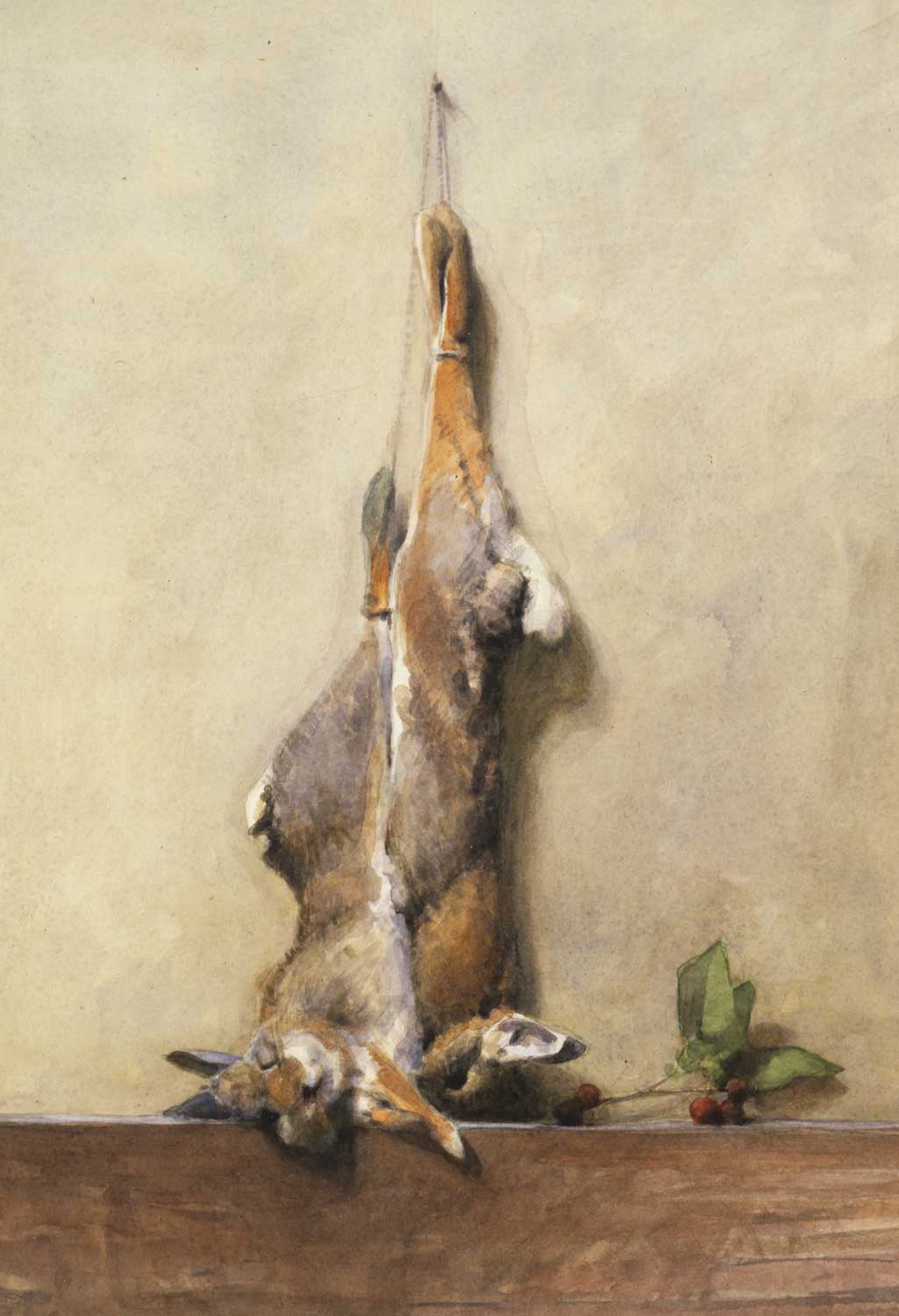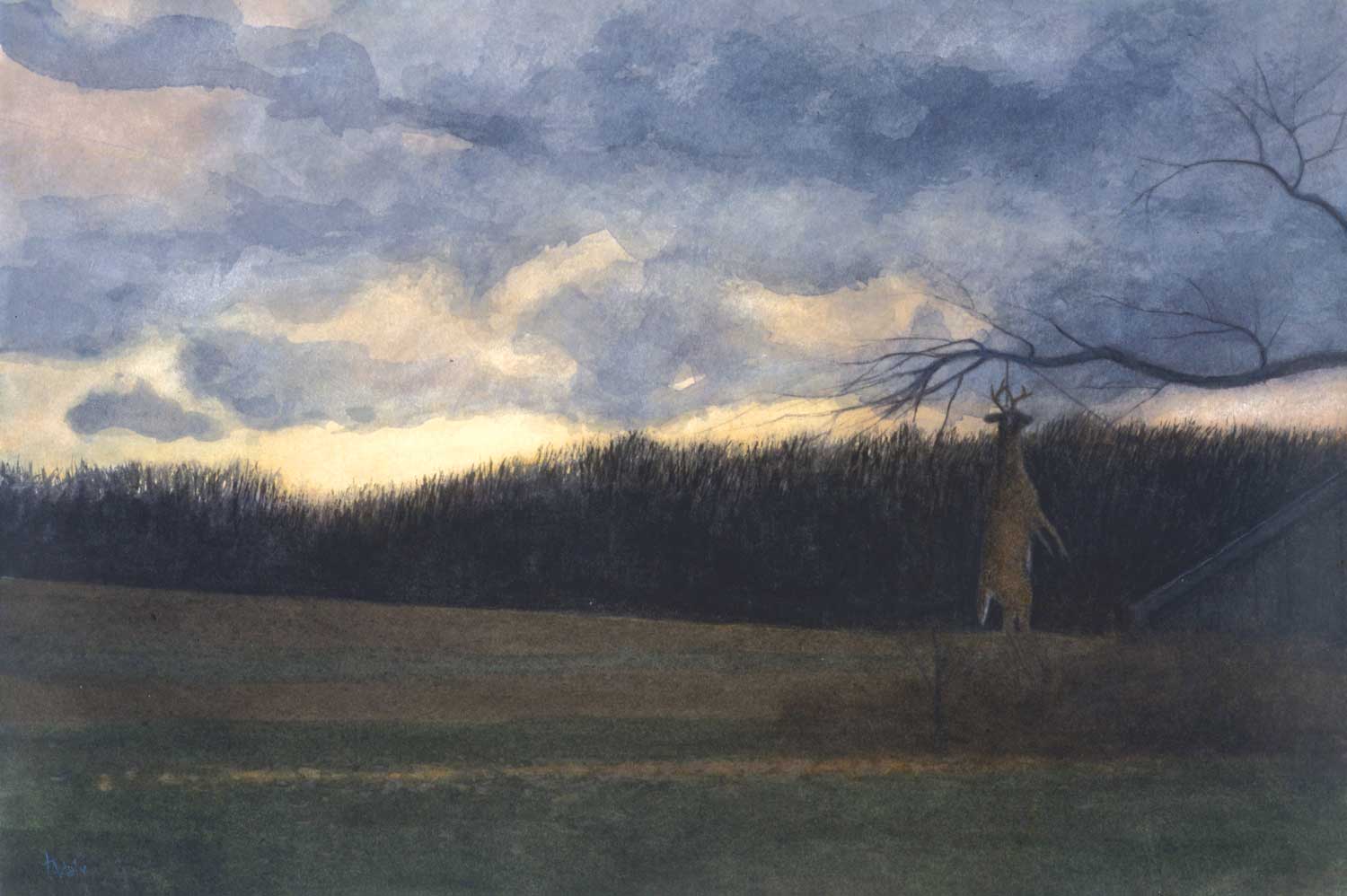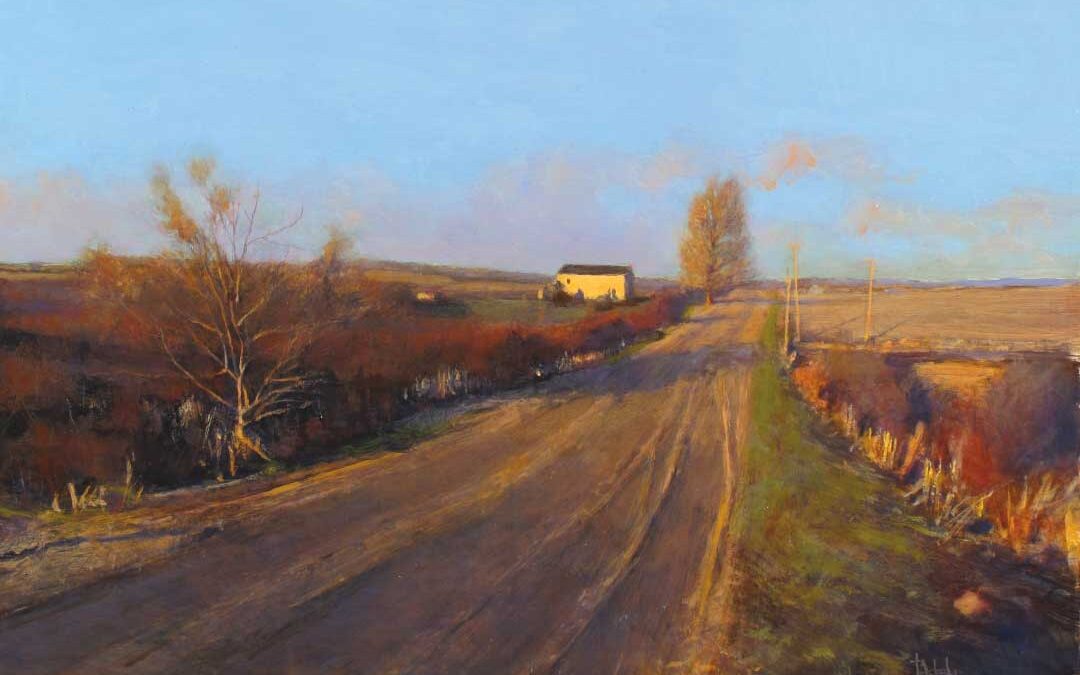The right or wrong of hunting has nagged at me from the beginning, and after a decade of hunting I finally set out to think it through.
I agree with the sentiment of writer Edward Abbey: “Hunting is one of the hardest things even to think about.” As is my way, I began by reading up on the history of hunting and the raging debate over its morality.
Every schoolchild learns that Homo sapiens were born hunters. The Encyclopedia Americana begins its hunting entry with this sentence: “Man has always hunted.”
Our pre-human ancestors hunted a millions years ago. Some anthropologists believe that the teamwork hunting required may have helped wire human brains for cooperative enterprise, shaping the human sexual division of labor and the very nature of family structure. A Paleolithic man or woman engraved a shamanistic image of a speared and disemboweled bison on their cave wall in Lascaux.
The Greek goddess Artemis was a huntress. It was her affection for fellow hunter, Orion, that caused her jealous twin brother, Apollo, to have Orion killed. In her grief, Artemis hung her friend’s likeness in the nightly sky for us to see even today.
Closer to home, in Barren County, hunting dates back at least ten thousand years to the last ice age, as do cottontail rabbits. Native Americans later consecrated the country’s land “bloody ground” in honor of the buffalo they slaughtered every year.
In the 19th century American city dwellers demanded so much game that commercial hunters annihilated entire species, most notoriously the passenger pigeon. It was sportsmen hunters – now so often decried as brutes by anti-hunters – who first demanded an end to such blue-sky slaughterhouses.
It wasn’t the history of hunting that seemed to me most important, however, it was the meaning we had made of hunting. If you can read only one book on the cultural significance of hunting, read A View to a Death in the Morning by anthropologist Matt Cartmill: “The importance of hunting lies in its symbolism, not its economics.”
In ancient Greek literature, hunting symbolized the just conquest of man over beast. In medieval European thought, hunting was a stand-in and training ground for war. To Romantics at the turn of the 18th century, hunting was a depraved human intervention in the natural beauty of nature. With Darwin’s 19th-century survival of the fittest, hunting looked like nothing more than a piece of nature’s brutal course. With the rise and fall of Nazism, hunting came to symbolize man’s innate tendency toward violence, a view that Cartmill says strongly influenced the creators of the famous Walt Disney anti-hunting film Bambi.

Rabbits and Crabapples by Thomas Aquinas Daly.
The battle over the meaning of hunting still rages, with hunting opponents arguing that its practitioners must be somehow deranged, even sadistic. The best of the critics believe no sentient being should be put to death in field or slaughterhouse when humans no longer need flesh to survive.
I respect critics who eat no meat, poultry, fish, eggs or cheese; who drink no milk, wear no leather or felt; who carefully read supermarket labels to be sure any item they buy is free of animal by-products. They are battling for a high-minded cause. Our culture exists on the exploitation of animals, and these people pay a huge daily price in effort and sacrifice.
It is the lazy hunting-haters who gall me. People like the woman at my first rabbit feast years ago, who said, “I can’t believe you killed those little bunnies.” People who partake in the routinized, industrial, daily bloodbath of animals but who think shooting a single rabbit is immoral.
Every year hunters kill 135 million rabbits, dove, squirrels, ducks, quail, pheasant, deer, geese and elk. A mind-boggling slaughter? It’s very little compared to the more than 800 million animals killed in slaughterhouses every year. We are a society awash in animal blood. Most people eat flesh as guiltlessly as they breath air. So why do so many believe hunting is immoral?
Remember, it’s not hunting; it’s the hunter. Men don’t hunt for sustenance anymore. We hunt for the anthropologists’ reason – as a piece of human ritual. I hunt for the pleasure of forests and fields, companionship, for what my son can learn about lives foreign to his own. I hunt to experience the moments of heightened acuity that modern life seems to dull. I hunt to experience the story. Yet, as I returned to hunt year after year, I came to realize that hunting was more than a search for human meaning in place and experience.

November Sky by Thomas Aquinas Daly.
I was struck when I read the words of Montana nature writer M.R. James: “How can any man or woman, city born and bred, expect to know firsthand – to understand – that killing is a daily part of life for all of us? . . . There is no blood, urine and fecal matter mingling on the polished aisles of grocery stores. There are no steaming piles of intestines, no sounds of hide being ripped away from muscle, no odor of death in the conditioned air . . . If the emotional issue is one of life itself, I ask, does not the calf waiting in the feedlot surely value its existence as much as the deer standing in the forest shadows?”
I believe this on principle. It doesn’t matter to a rabbit what kills him – fever, flukes, worms, weather, hawks or me. The rabbit is dead. No mystical link exists between the rabbit’s life and death and my motivation in killing him. The rabbit doesn’t care. We care.
Those who despise hunting seem to believe that killing and eating an animal, as opposed to eating an animal that has been killed for us, stirs in men some primal sadism.
“There is a passion for hunting something deeply implanted in the human breast,” Charles Dickens wrote. Those who despise hunters believe we can conquer that passion if we eat only animals that have been killed anonymously. Man’s buried inhumanity then can be kept at bay because the beast has not been stirred, as if blood once felt warm and damp on our hands will make us crave more killing.
Only hunting – actually killing animals myself – taught me how wrong, how upside down, that perspective
is. It’s what the intellectuals would call counterintuitive. Killing an animal doesn’t deaden the human conscience; it enlivens it. It jars it into being. It shocks the conscience awake like a bucket of cold water thrown in a sleeping man’s face. Not the small conscience of venial sins but the big conscience of original sin – the sin of existence.
Paradoxically, the inhumanity of killing an animal calls forth a man’s buried humanity. I am a novice hunter, and shooting rabbits is hardly even hunting for men in the tradition of stalking bull elk in Norway, brindled gnu in Africa or warthog on the Nile.
Still, the sensations for the hunter must be universal. I remember once standing over a rabbit I had shot and seeing that it had no visible sign of a wound, that the rabbit looked as pure as its mythology. Then blood began to flow from just above the rabbit’s hip in a rivulet that expanded and pooled in a quarter-sized, then half-dollar-sized lake bounded by an oval bank of fur.
I watched and thought that this flow was the last motion of life this animal would ever know. And I had done that! I told myself that slaughtering the rabbit was no different from the slaughter of a chicken I would guiltlessly buy at the Safeway. But, God, it felt different.
And it continues to feel different – forever. Hunting isn’t golf or tennis, which demand only technical mastery. Hunting isn’t merely an exercise in male bonding, as so many believe. Hunting has moral gravitas.
“Every good hunter,” philosopher Ortega y Gasset wrote, “is uneasy in the depths of his conscience when faced with the death he is about to inflict on the enchanting animal . . . It is the frightening mystery of blood.”
That’s why it’s right that I should have dreams in which dead animals are resurrected in my hands, because killing doesn’t feel good. Hunting contradicts my idea of my own decency. And having killed many animals doesn’t make me feel less guilty for the last one I killed. The last animal killed only reminds me of what I’ve done, and what I’ll go on doing – in either field or supermarket.
I now realize why the moments just before, during and after the killing compare to life’s moments of grace. In the words of the hunter and poet Bruce Woods: “At such moments I am as pure a creature as I’ll ever be, involved in an act of monumental seriousness.” Remember William James on the instant of religious conversion: “The mysteries of life become lucid.”
Only after I began hunting was I hit with the shock that something deep inside me gets excited when the prey appears, when the dogs howl, and that maybe I’m not that different from those dogs, that I must work at being human. The poet James Dickey understood:
And when I pluck my longbow off the limb
Where it shines with a musical light,
And crouch within death, awaiting
The beast in the water, in love
With the palest and gentlest of children,
Whom the years have turned deadly with knowledge:
Who summons him forth, and now
Pulls wide the great, thoughtful arrow.
For centuries, hunting has been a metaphor for the way we would like to imagine ourselves. I take the unromantic view that big fish eat little fish, that forests are always trying to colonize pastures, that a doe rabbit can bear 49 offspring a year because rabbits are the McDonald’s restaurant of the wild. I believe all this goes on without human meaning, a machine in perpetual motion.
As much as I admire anthropologist Cartmill’s book, his conclusion reveals the confusion of a man who has never hunted: “The anti-hunter can still legitimately retort that enjoying the fruits of the kill is not the same thing as taking pleasure in killing itself.”
If Cartmill were a hunter, he would know better. It is people who enjoy the fruits of the kill without feeling the ominous responsibility of the killing who are morally delinquent. Is a family spread around the Thanksgiving dinner table, heads bowed in prayer before a golden-brown, store-bought turkey any less guilty than a hunter of taking part in a human ritual at the expense of a sentient being?
Even those who refuse to eat meat or wear leather, who are trying to live their beliefs, can’t escape their place in nature’s balance – or imbalance. Habitat destruction from development is far more devastating to wild animal populations than is hunting, but animal lovers still buy new homes and shop at malls. They pour insecticides on their lawns. They drive cars that kill countless wild animals a year. And what of the vegetarians who eat grains from croplands that sprawl as far as the eye can see and have wiped out boundless acres of animal habitat? It’s a silent slaughter, and being blissfully ignorant of the carnage makes it no less ferocious.
I was at my dining room table eating a rabbit just the other day. While I was tearing a slice of thigh off the bone, I found myself thinking something I had never thought before: Which rabbit is this that I am eating? Is it the rabbit Matt killed in the blackberry patch beyond Bobby’s farm? Is it the rabbit Alex held open on the upturned trashcan so Matt could pick off the last bits of organ? Or is it the rabbit Alex had quietly cleaned despite his gruff assertion that Matt should clean his own rabbits?
I have never wondered any such thing about a bit of Thanksgiving turkey.
Killing an animal doesn’t deaden the human conscience; it enlivens it.
It jars it into being. It shocks the conscience awake like a bucket of cold water thrown in a sleeping man’s face.
The noblest qualities of men have always been that they take responsibility for acting, for showing their love by doing and protecting, for keeping a cool head in tough times. Men are realists. And when a man hunts, he accepts the most realistic of burdens: that something – plants or animals or, often, both – must die for him to stay alive. When I feel guilty for killing a rabbit, it isn’t weakness in me; it isn’t my conscience telling me that hunting is wrong. I think of Alex, who has never liked the killing but who hunts anyway, and I have finally figured it out.
I’m not supposed to hunt without guilt.
I’m supposed to hunt despite the guilt.
If this confounds you, think of these lines from Barry Lopez’s beautiful book Arctic Dreams: “No culture has yet solved the dilemma each has faced with the growth of conscious mind: how to live a moral and compassionate existence when one is fully aware of the blood, the horror inherent in all life, when one finds darkness not only in one’s own culture but within oneself.
“If there is a stage at which an individual life becomes truly adult, it must be when one grasps the irony in its unfolding and accepts responsibility for a life lived in the midst of such paradox . . . There are simply no answers to some of the great pressing questions. You continue to live them out, making your life a worthy expression of leaning into the light.”
I’m glad my son, even if he never hunts again, has experienced that paradox. I’m not at all worried that hunting animals will make him cold and heartless, because I understand now that hunting animals nurtures the heart. I’m glad he has entered a world of allegedly brutish men and realized their humanity, that he has gotten some inkling that there is more to heaven and earth than is in his philosophy. I’m glad that he has learned what it means to hold life and death in his hands, to be mindfully alert, to watch the world near and far away at the same time. I’m glad he has recognized that what so many self-righteously view simply as a good-versus-evil debate is the place where real thinking must begin. I’m glad he has realized that appropriating Nate Smith’s cow pies, barbed-wire fences, and rabbits for our affirmation is the inevitable way we go about making ourselves human, that we are, like rabbits, a footprint in this place.
And I’m glad I have realized all these things myself.
On my first Thanksgiving morning in Glasgow, I had set out to humor my father-in-law, to keep from looking like a city effete who imagined he was too good to get down with the menfolk. It was a minor social obligation. A decade later, my obligatory experiences were coming back to me with new meaning. Compared to the mysteries of life I discovered while hunting with the men, the matters that once obsessed me in Washington – achievement and stature, money and image – seemed awfully trivial.
I thought about my Washington friends who had no hope of comprehending how little they understood about hunting, which they believed they understood completely. How little they understood about men like Alex, Bobby, Lewis and Carl. I didn’t want to convince them otherwise. I just wanted to remember that I myself had once thought that way, too. I wondered how many others of my beliefs, how many confident opinions I held about matters and people unknown to me, were equally shallow, arrogant and wrong. Once again, my time with Alex, Bobby, Lewis and Carl made me humble.
Long ago, a woman at my table said to me, “I can’t believe you killed those little bunnies.”
I know that I should have said in response, “I can’t believe you ate those little bunnies without killing one.”
Note: This excerpt is from the chapter “Nate Smith’s Diary Farm,” which appears in Walt Harrington’s The Everlasting Stream: A True Story of Rabbits, Guns, Friendship and Family. Published by Grove Press in 2004.

